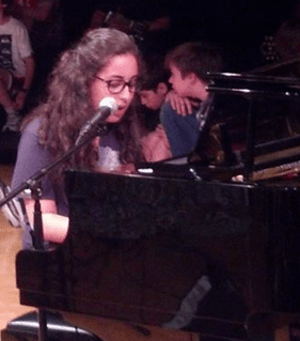A Jewish Woman's Place At The Table
I’ve grown up in the epitome of a noisy Jewish household. For me, a large part of the Jewish cultural experience consists of rapid-fire Shabbos dinner debates that leave you with a sore throat and a full stomach.
Today, I express my Jewish identity in many different ways, one critical way being through prayer. When I was younger, I saw my weekly Shabbat service as a routinized set of familiar tunes. But today, I see prayer as far more. I always knew there was something inherently holy about letting music move me, and about singing and davening with my fullest self.
But not everyone’s Shabbos table is like mine. My parents and I were invited to my cousin’s home for a women’s Tish, where we gathered and sang following their youngest child’s bar mitzvah. Thirteen women sat huddled around a kitchen table and they allowed their magnificent voices, voices that I had never heard, to fill the room. It was an echoing chorus of strong women radiating joy as the z’mirot, the traditional Shabbos songs, escaped their lips. But then the joy broke—with the sound of a door opening. He walked in the room, and as if on cue, everyone abruptly stopped singing. The women sat still and silent, as a young man, no older than 25, entered the room. He lifted his hat from a chair and then left. The music commenced upon his exit, but it didn’t fill the room like it had before. There was something significant missing, and I knew exactly what it was. They were missing their voices. They were silenced. I was silenced too.
During this eye-opening (and ear opening) moment, I realized that all women have strong, beautiful voices—but not all women can raise them. Although time has passed, those lovely voices still ring in my head, a reminder that I deserve to be heard, and that all women deserve to be heard. It’s a wake up call, alerting me that I do not live in a society where the voices of Jewish women can always light up the world the way they lit up that room.
This cry for empowerment is present in all aspects of my life. My voice is needed when only the boys lead Shabbat singing at my egalitarian Jewish summer camp. It’s needed when I can’t make a Ma’ariv minyan, but the disinterested boy sitting on my right can. It’s needed when I’m singing with my school’s Jewish a capella group to remember Kristallnacht. It’s needed holding picket signs on Capitol Hill.
For these reasons and countless others, my Jewish world needs feminism. Feminism has been and always will be a responsibility to myself, to my community, and to the Jewish girls who come after me. Feminist ideals and action have helped me find my voice and share the song in my heart. The belief that a woman’s voice should never be silenced is one that all denominations of Judaism should share and foster.
Somewhere between dinner table debates and belting Barbra Streisand ballads out my bedroom window, I realized my lungs have immense power, and that I won’t stand for silence. As an empowered Jewish teenage girl, I stand for speech, song, and the power of the voice.
This piece was written as part of JWA’s Rising Voices Fellowship.







